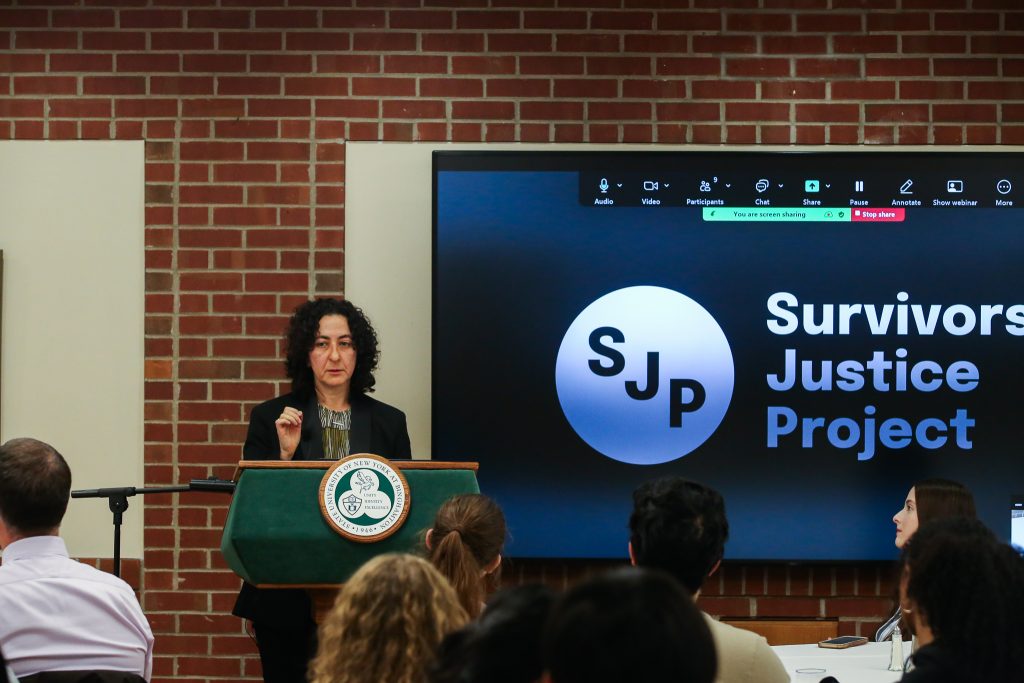Kate Mogulescu ‘99, a professor and advocate for survivors of violence and systemic reform in the criminal legal system, explored how survivors of interpersonal and systemic violence are treated in a lecture last week.
Her talk, titled “Criminalization & Survival,” united the campus community to explore how trafficked women are treated by the criminal justice system. The talk was part of the annual John and Lawrence Bonzani Memorial Law Lecture, held during the fall semester and delving into topics in the law field. In the past, the lecture series has featured Harpur College alumni who bring their professional expertise to campus, helping to inspire students pursuing careers in the legal field.
Mogulescu heads the Criminal Defense & Advocacy Clinic at Brooklyn Law School, which she launched in 2017. She spent 14 years working as a public defender at the Legal Aid Society, where she founded efforts like the Exploitation Intervention Project to represent sex workers and victims of exploitation facing prosecution for other offenses in New York City. She leads other initiatives, which include the Survivors Justice Project and the Human Trafficking Clemency Initiative, advocating nationally for post-conviction support for trafficking survivors.
The lecture focused specifically on Mogulescu’s work in the Survivors Justice Project, a collective of activists, lawyers, social workers, students and researchers — many of whom are survivors of domestic violence and long-term incarceration — dedicated to implementing New York’s Domestic Violence Survivors Justice Act. Established in 2020, the Project mobilized a network to ensure survivors most in need could access legal relief. The Project aims to address the criminalization and over-incarceration of survivors, advocating for fairer sentencing and decarceration.
After short opening remarks from Harpur Edge Director Erin Cody and Harpur College Dean Celia Klin, the lecture began with a brief summary of Mogulescu’s goal for the lecture.
“We’re going to talk a little about the criminal legal system and the way in which it impacts survivors,” she said. “Rather than, as some people might assume, offering protection, resources, support — how our legal system further marginalizes and creates vulnerability. In that sense, we are going to think about what happens when these massive, inflexible legal systems don’t do what they purport to do — particularly when it comes to women who have experienced abuse.”
While the lecture focused largely on women’s experiences, Mogulescu acknowledged that human exploitation and violence affect people of all genders. After describing her experience as a public defender, she discussed an observation she made when representing female clients — which was especially notable in cases involving prostitution.
“No matter what case had been heard right before someone stood in front of the court on a prostitution charge, everything changed when that case was called into the record and that person stood before the court,” Mogulescu said. “There was a tremendous interest — ’what do they look like, what are they wearing, what can we kind of deduce from this?’ — that wasn’t happening in the series of cases that came before it. And most of these people were women.”
She later discussed how the Domestic Violence Survivors Justice Act — passed in New York in 2019 — allows courts to resentence domestic violence survivors in certain situations where a survivor’s “sexual, psychological or physical abuse” contributed to the charges — allowed dozens of victims to claim reduced sentences.
She then recounted a personal experience with a survivor who became emotional after a judge read aloud a list of violent acts that Mogulescu petitioned to have resentenced, highlighting how legal institutions often overlook the humanity of those caught in the system.
Last year, a local woman was resentenced under the law and released from the Broome County Jail after being sentenced to ten years in prison for fatally stabbing her boyfriend.
“I think it’s actually fortuitous that the topic is extraordinarily timely, given what’s going on in the political environment and with criminal justice in general,” said Andrew Bonzani ‘86, a brother of John and Lawrence Bonzani. “It was just pure luck to have someone like [Mogulescu] to talk about the sort of decriminalization of systemic abuse that women have gone through.”



